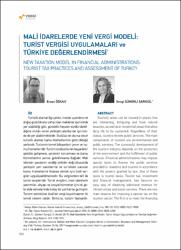| dc.contributor.author | Özkan, Ersan | |
| dc.contributor.author | Sümerli Sarıgül, Sevgi | |
| dc.date.accessioned | 2022-05-11T14:48:02Z | |
| dc.date.available | 2022-05-11T14:48:02Z | |
| dc.date.issued | 2019 | |
| dc.identifier.issn | 1303-6920 | |
| dc.identifier.issn | 2667-5099 | |
| dc.identifier.uri | https://app.trdizin.gov.tr/makale/TXpRek56VTVPUT09 | |
| dc.identifier.uri | https://hdl.handle.net/20.500.11776/10590 | |
| dc.description.abstract | Turistik alanlar ilgi çekici, merak uyandırıcı vedoğal güzelliklere sahip olan mekânlar içerisindeyer alabildiği gibi, gündelik hayatın sürdürülebildiğine imkân veren yerleşim alanlarının içerisinde de yer alabilmektedir. Statüsü ne olursa olsunturistik alanlar kamu hizmetlerinin götürüldüğüyerlerdir. Turizmin temel bileşenleri çevre ve kamu hizmetleridir. Turizm endüstrisinin başarılı birşekilde gelişmesi, çevrenin korunması ve kamuhizmetlerinin yerine getirilmesine bağlıdır. Maliidareler yasaların verdiği yetkiler doğrultusundayerleşim yeri sakinlerine ve turistlere sunulankamu hizmetlerini finanse etmek için özel vergiler uygulayabilmektedir. Bu vergilerden biri deturist vergileridir. Turist vergileri, mali idarelerinyatırımlar, altyapı ve sosyal hizmetler için ek gelir elde etmelerinde kolay bir yol haline gelmiştir.Turizm sektörüne özel bir vergi koyulmasının ikitemel nedeni vardır. Birincisi, turizm faaliyetlerinin neden olduğu negatif dışsallıkların ortadankaldırılmasında ihtiyaç duyulan finansman ihtiyacını karşılamak, ikincisi ise sosyal fayda amaçlıdüzenleyici etkiler yaratmaktır. Gerçekleştirilenbu çalışma, turist vergisinin Türkiye’de uygulanması durumunda sağlayacağı avantajlara veuygulanabilirliğine dikkat çekmek üzere hazırlanmıştır. | en_US |
| dc.description.abstract | Touristic areas can be located in places that are interesting, intriguing and have natural beauties, as well as in residential areas that allow daily life to be sustained. Regardless of their status, tourists receive public services. The main components of tourism are environmental and public services. The successful development of the tourism industry depends on the protection of the environment and the fulfillment of public services. Financial administrations may impose special taxes to finance the public services provided to residents and tourists in accordance with the powers granted by law. One of these taxes is tourist taxes. Tourist tax, investment and financial management, has become an easy way of obtaining additional revenue for infrastructure and social services. There are two main reasons for imposing a special tax on the tourism sector. The first is to meet the financing needs needed to eliminate negative externalities caused by tourism activities, and the second is to create regulatory effects aimed at social benefits. Conducted this study, the tourist tax is intended to draw attention to the advantages and applicability to the case enables implementation in Turkey. | en_US |
| dc.language.iso | tur | en_US |
| dc.rights | info:eu-repo/semantics/openAccess | en_US |
| dc.title | MALİ İDARELERDE YENİ VERGİ MODELİ: TURİST VERGİSİ UYGULAMALARI ve TÜRKİYE DEĞERLENDİRMESİ | en_US |
| dc.title.alternative | New Taxation Model in Financial Administrations: Tourist Tax Practices and Assessment Of Turkey | en_US |
| dc.type | article | en_US |
| dc.relation.ispartof | Vergi Raporu | en_US |
| dc.department | Rektörlüğe Bağlı Bölümler, Rektörlük | en_US |
| dc.identifier.volume | 0 | en_US |
| dc.identifier.issue | 243 | en_US |
| dc.identifier.startpage | 180 | en_US |
| dc.identifier.endpage | 192 | en_US |
| dc.institutionauthor | Özkan, Ersan | |
| dc.identifier.trdizinid | TXpRek56VTVPUT09 | en_US |



















